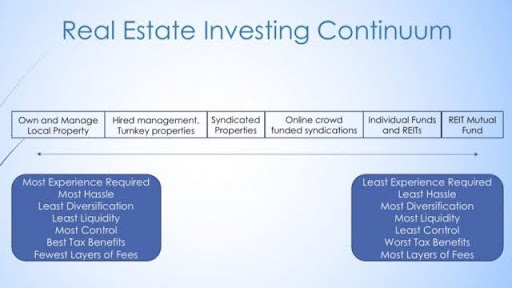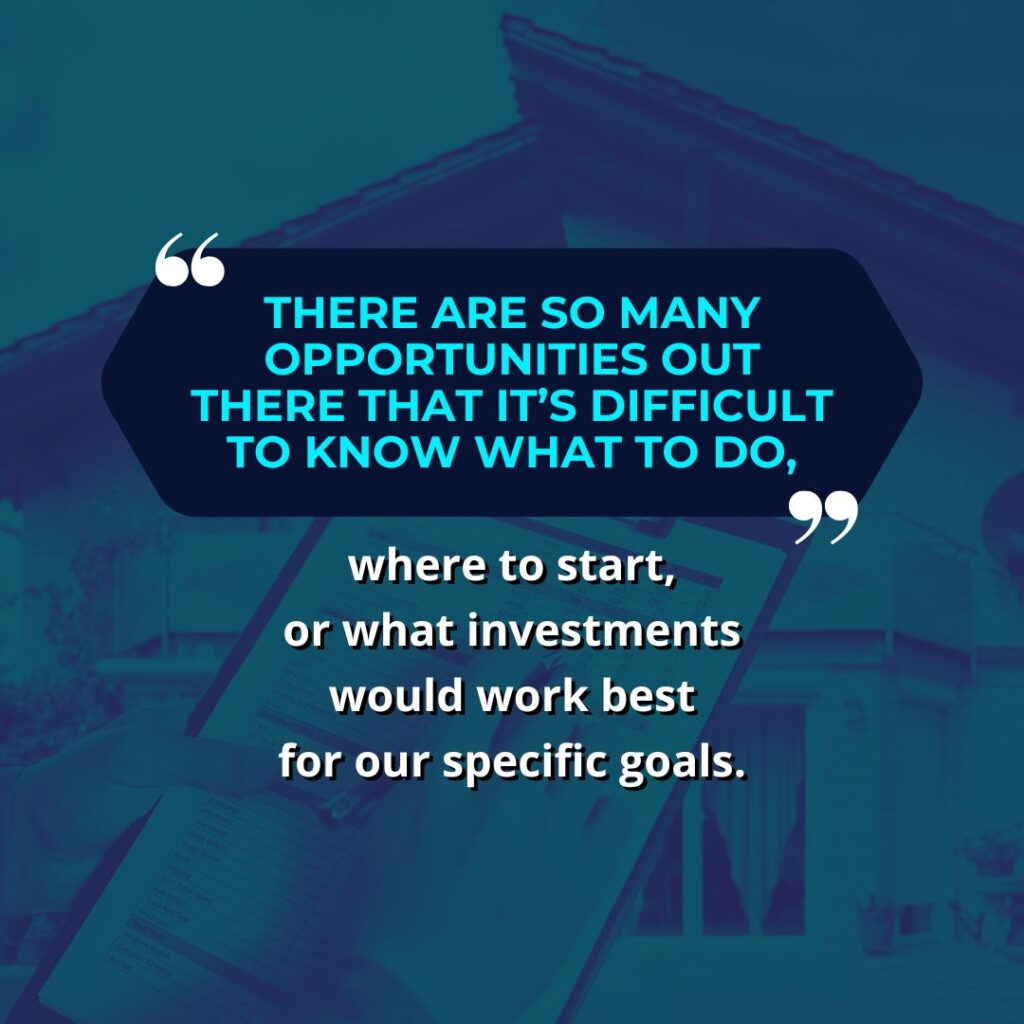Real estate investing can be overwhelming. But it doesn’t have to be.
I was overwhelmed when I first started. There are so many opportunities out there that it’s difficult to know what to do, where to start, or what investments would work best for our specific goals.
As high-income professionals, we have the financial resources necessary to create financial freedom before we retire. Yet we lack the fundamental knowledge about how to begin that journey of passive real estate investing.
Don’t delay; seize the opportunities ahead and provide yourself lifelong stability and security by understanding essential tips on how to invest in real estate. Thankfully, that’s what we’re here to look at in today’s article. So let’s get started.
Table of Contents
Determine Your Preferred Investment Profile
If you’ve ever been part of a community at Passive Income MD or spent time in our Passive Real Estate Academy, you’ll know that there is an investing continuum to help not only demystify the ins and outs of real estate but also help investors match to their most beneficial investment structure.
“Investment structure” sounds like a scary word, but it’s just how you invest in real estate. To determine that structure, you first need to create an investment profile of your preferences, and you can use something called “the real estate investment continuum.”
I’ll describe the real estate investment continuum in more detail later, but here’s an overview. On one side, you can invest with maximum control, and on the other, you can invest with maximum diversification.
Which do you like better, control or portfolio diversification? Beyond those two primary features, there are more elements to consider when building your profile.
Let’s briefly look at them all.
Equip yourself with the necessary knowledge and practical steps in real estate by SUBSCRIBing AND TUNing IN TO OUR PODCAST:
#202 3 Foundational Books for Real Estate Investing Beginners ft. Dr. Peter Kim
Experience: How much experience do you have, and how much are you willing to gain? Real estate investments can vary wildly in terms of how much experience you need to bring to the table. For a simple REIT mutual fund, which functions much like buying and trading stocks, you only need experience in due diligence. Comparatively, if you want to be the sole owner of a rental property, you’ll have to know quite a bit about the housing industry, not just due diligence.
Hassle: How much time are you willing to commit to your investments? On a scale of a lot of time to very little time, where do you stand? Some investment methods, such as turnkey properties, require a lot more of your attention than, say, gaining a percentage of profits from crowdfunding a deal. How much time you have may determine how you enter the world of real estate investment
Diversification: What is your investment risk tolerance, high or low? Some investors prefer their investment portfolio is diversified so that, if some investments should fail, others are there to ensure financial stability. That will mean they invest in many different deals to cover their bases. Other investors might want to hit the home run; those high-risk, high-reward investment styles that can pay off big time.
Liquidity: Each of us has a lifestyle that demands a specific amount of cash. It’s important to keep in mind that some forms of real estate tie up our cash while others can provide a steady stream of cash flow. What is your liquidity preference? Do you need more or less cash on hand? These answers will dictate your investment choices.
Control: Are you the type of person who wants to drive out and see the property you’re buying? Or are you fine with investments that exist as reports on paper? Many new investors like the secure feeling of control that comes with being able to go out to a property and fix something themselves rather than relying on a sponsor to take care of everything.
Tax Benefits: As physicians, taxes are usually our favorite subject. Real estate investing can be tax advantaged, letting the tax code accelerate your passive income earnings. But that is not the only way to invest in real estate—many opportunities function like regular investments that are otherwise taxed at normal rates.
Fees: If Benjamin Franklin were to revise his famous “nothing can be said to be certain, except death and taxes,” he might add “fees” to the list. But again, this is a layer of real estate investing you can navigate. If avoiding fees is important to you, there are certain investments that will be more attractive to you than others.
With all of these factors in mind, it’s time to determine your profile. Do you want less hassle but more liquidity? Or maybe having tax benefits and diversification sounds great to you? Whatever your investment preferences might be, naming them is the important first step in finding out what investment structure might work best for you on the continuum of options.
Find Your Place on the Real Estate Continuum
Now that you have a better idea of your investment preferences—your profile—let’s apply those factors to the real estate investing continuum. Here’s what the entire continuum looks like.

What methods of investments seem to match your profile? If you like a lot of control, major tax benefits, and fewer fees, owning a local rental or turnkey property might be right for you. If, on the other hand, you prefer having liquidity and portfolio diversity, maybe REITs and syndications are more of your investment style.
But you may still be in the dark, unsure of what these investment methods are. Let’s define each one of them. Doing so will help you determine if they fit your profile (or if you might need to adjust your profile slightly).
Owning and Managing Rental Property
This is direct real estate ownership, usually of a commercial building or a multifamily complex such as an apartment building. If you want control over the investment, are in it for the long haul (and don’t need cash flow now), are looking to take advantage of the best tax benefits, and your family doesn’t mind the occasional trip out to the property, this is for you.
For those who don’t like hassle, you can always hire out help, such as a property manager. The more help you hire, the more fees you incur, cutting on your bottom line. There is a thought that these properties create “outsized” returns and are home-run investments, in terms of accelerating wealth, but you have to keep in mind the value of your time.

Confidently Invest in Passive Real
Estate Deals in Just Four Weeks!
Everyone knows that investing in real estate can be intimidating, but it doesn’t have to take years to learn. Passive Real Estate Academy (PREA) is your opportunity to join a community of like-minded investors who will show you how to leverage other people’s time, capital, and experience to create your ideal life.
Our course in passive income for physicians meets you where you are. Whether you’re entirely new on your journey to financial freedom or are already building your passive income streams, you’ll find value in our course that expedites the process of becoming an expert.
Join a community of doctors who support each other on the journey to creating passive income!
Turnkey Property
These are renovated and ready-to-go homes or apartment buildings that, after purchase, are ready to be immediately rented out. All you need to do to get going is turn the key, as the name suggests. In terms of profile, this is very similar to direct ownership. However, the initial investment takes a lot of the hassle out of the setup process…but comes at a cost. Most turnkey properties are purchased at a higher price—paying a premium to the company that renovated the property.
However, once the property is yours, you can expect asset growth consistent with real estate as well as an increase in hassles over time (for example, what if the roof fails?).
Syndicated Properties
In general, syndications are about pooling funds from multiple investors. Typically this means you get equity, becoming co-owners of the property and all of the rights and control that might entail.
Traditionally, they focus on bigger properties, meaning that it can take a lot of cash to invest in a syndicate. Investment terms vary from five to ten years, meaning your liquidity will be locked up for a certain amount of time while you collect monthly or annual dividends. And, apart from your upfront due diligence, you are giving up control of the investment to a sponsor or operator who will manage the investment. On the other hand, you don’t have any responsibilities to worry about other than making the initial investment and checking the reports. This is a truly passive investment.
The cash-on-cash return for the typical syndication is 7 to 10%, far outpacing inflation and many other investment opportunities (like CDs). Of course, this comes at the cost of having a high barrier for entry, which is different from crowdfunded syndications.
Online, Crowdfunded Syndications
Although very similar to syndications, crowdfunded syndications differ in a couple of key ways. First, anyone can invest—not just accredited investors. That lowers the level of entry but also increases the risk. Although crowdfunding platforms require due diligence, they tend to fail more than traditional syndications.
Second, they have smaller investment terms, averaging around two years. That’s great if you love liquidity because you’ll be out of the investment relatively quickly. You can then take your earnings and reinvest in new deals to keep your passive income streams flowing and growing.
Individual Funds and REITs
REITs are publicly traded by companies that own and manage real estate portfolios. Investors purchase shares in these companies, granting them exposure to real estate assets without direct ownership. REITs offer liquidity and dividend income, although they may correlate with stock market fluctuations and lack the tax benefits of direct ownership.
Real Estate Mutual Fund
There are a lot of similarities between REITs and real estate mutual funds, but there are a few crucial differences. First, they aren’t traded like stocks. You buy them directly from the company that created the fund, like an online brokerage.
And where REITs pay out regular dividends, real estate funds provide value through appreciation. For that reason, they are seen as lang-haul investments and not for folks looking for short-term answers.
They can be passively or actively managed. Some funds invest in REITs while others invest directly into properties. REITs can be more liquid than funds since they are traded daily, but they are both pretty liquid.
Now You Know—Get Started Today!
Where did you land on the real estate investment continuum?
Our hope is that you now have a better idea of what real estate investment methods speak to your investment profile and preferences. With this exciting first direction, start to dip your toe in the water. Do some additional research on the investment methods that might work for you and learn what actions to take in order to build multiple streams of passive income.
As you take action, ensure that it reflects your risk tolerances and financial goals—something to talk with a CPA and financial advisor about.
Careful real estate investing can ensure the financial freedom to unlock the life of your dreams. Passive Income MD is here to support you on the road to the enduring wealth you’ve envisioned for your future. Join our communities of like-minded people to learn from experience, get connected to other investors and investment opportunities, and ease your transition into real estate investment.
Until we see you next time, stay inspired and keep educating yourself on how real estate investments can create life-changing passive income
Peter Kim, MD is the founder of Passive Income MD, the creator of Passive Real Estate Academy, and offers weekly education through his Monday podcast, the Passive Income MD Podcast. Join our community at the Passive Income Doc Facebook Group.
Further Reading


